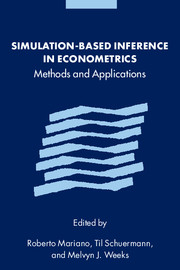Book contents
- Frontmatter
- Contents
- List of contributors
- Foreword by M. Hashem Pesaran
- Part I Simulation-based inference in econometrics: methods and applications
- Part II Microeconometric methods
- Part III Time series methods and models
- Introduction
- 7 Simulated moment methods for empirical equivalent martingale measures
- 8 Exact maximum likelihood estimation of observation-driven econometric models
- 9 Simulation-based inference in non-linear state-space models: application to testing the permanent income hypothesis
- 10 Simulation-based estimation of some factor models in econometrics
- 11 Simulation-based Bayesian inference for economic time series
- Part IV Other areas of application and technical issues
- Index
Introduction
Published online by Cambridge University Press: 04 August 2010
- Frontmatter
- Contents
- List of contributors
- Foreword by M. Hashem Pesaran
- Part I Simulation-based inference in econometrics: methods and applications
- Part II Microeconometric methods
- Part III Time series methods and models
- Introduction
- 7 Simulated moment methods for empirical equivalent martingale measures
- 8 Exact maximum likelihood estimation of observation-driven econometric models
- 9 Simulation-based inference in non-linear state-space models: application to testing the permanent income hypothesis
- 10 Simulation-based estimation of some factor models in econometrics
- 11 Simulation-based Bayesian inference for economic time series
- Part IV Other areas of application and technical issues
- Index
Summary
The simulation-based inference literature grew out of problems faced by microeconometricians in estimating discrete choice models in cross-sections. The classic problem is the multinomial probit model which encounters the computational barrier if there are more than four alternatives. Generically the problem is one of evaluating highly complex conditional expectations no matter what the data structure. Not surprisingly, time series econometricians have recently made increased use of the simulation-based techniques to solve some computational issues of their own. Some themes which emerge are the modeling of highly non-linear financial instruments, conditioning on pre-sample information and the evaluation of posterior distributions in a Bayesian context. This section presents several examples from this rapidly growing literature.
Many of the applications are in the area of empirical finance and macro-econometrics. The first chapter in this section by Christensen and Kiefer is a poignant example. Their contribution is a great step forward toward bridging the gap between recent developments in theoretical finance and econometric modeling. The finance theoretical point of departure is a probability measure under which suitably discounted security price processes are martingales. Knowledge of this equivalent martingale measure allows one to simulate long realizations of the theoretical price process whose moments can be matched to the empirical moments. Specifically, when evaluating option prices empirically, the analyst is forced to make the false assumption of complete markets with no arbitrage in order to make the problem tractable.
- Type
- Chapter
- Information
- Simulation-based Inference in EconometricsMethods and Applications, pp. 179 - 182Publisher: Cambridge University PressPrint publication year: 2000



